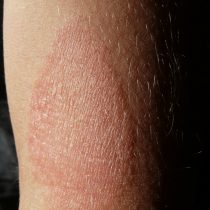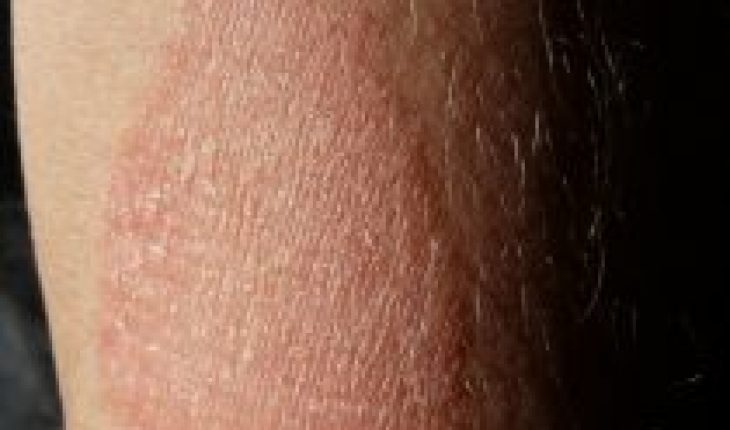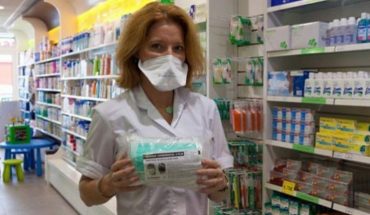
During these months, people with atopic dermatitis may be experiencing aggravation of the manifestations of atopic dermatitis on their skin. The main causes of this would be the change in temperature, cold and stress caused by quarantine.
Uncontrollable itching at night and multiplied spots on the skin are some of the most common expressions. It’s a situation that makes patients very uncomfortable, in a context where it’s difficult to attend a specialist and follow treatment.
Atopic dermatitis is a chronic inflammatory skin condition that is very constant in the country, genetically and physiologically allergic. It is more common in children, but can also occur in adults.
It usually manifests itself through red spots on the skin that cause a lot of swelling and itching. In addition, there are cases where it may come accompanied by asthma and allergic rhinitis.
Patients who are treated are greatly relieved of reactions, but there are external factors that, in situations like this, prevent them from having control over symptoms.
Alejandra Jeria (32) says that her 8-year-old son lately manifested the disease every two years, but that since the quarantine began she has already had two strong episodes. He started with these skin allergies from four months of age, it was difficult to find the definitive diagnosis and treatment that would actually bring him relief. When they finally managed to stabilize the situation, it began to hit him less frequently (once a year or every two years).
“The recommendations I have been given is that you can’t give bath, they have to be shower. Always be moisturizing the skin and logically the things that we know give you allergy not to do it. But there are reactions like the ones that gave him these months that to this day we have no idea what it can be,” says Alejandra, her mother.
This increase in atopic seizures has also been faced by Paula Ramirez (23), since childhood has skin disease. Many times they are just reactions that are expressed as redness accompanied by a little itching. But there are times when these spots end up in more painful wounds and itching is so much that it doesn’t allow you to sleep.
These latter cases qualify them as crises that affect their daily lives. This usually affects only one area of the body, but during the pandemic you have seen 3 or 4 altered, being much more complicated to keep in control all.
You should take a number of prevention measures that are part of your treatment: warm water showers, avoiding dairy, red meat or gluten, using emollient creams after showering, and giving yourself a “bath” of oat milk once a week, which has increased during these months.
Also, if you go out to buy you should duplicate your precautionary measures. “I use special soap which is much softer and I avoid alcohol gel at all costs. Only when I go into the jumbo or pharmacies they put if or if alcohol gel then, there I have to put up with me and get to my house to wash my hands well and then put cream on quickly”, says Paula.
Stress, sweat and cold as aggravating
Both confirm that, in their view, the stress of quarantine has produced these repetitive reactions.
“I think it’s still tied to stress processes. He’s used to it, quoted, but the two times he’s given him now in the pandemic were more awkward. I woke up on itchy nights, it used to be simple pimples that didn’t bother or wake him up at night,” Alejandra says.
Paula says doctors have told her that the current situation gives her new warning statements, which put her in a position of hard-to-carry stress, as the lockdown is in itself stressful.
“With the pandemic it becomes even more difficult to be consistent with those precautionary measures, the emotional state is super unstable which makes me more stressed (one of the most triggering factors of atopic reactions) and also having more anxiety in pro-inflammatory foods (dairy and gluten) then it is a very difficult vicious circle to treat,” says the 23-year-old.
Dermatologist Tomás Tabilo Bocic (@dermatologiatabilo), reaffirms that stressful situations and emotional instability are causing skin inflammation and manifestations of these diseases.
Another aggravating increase in atopic reactions is climate changes, whether towards heat and cold; Situation which Paula Ramirez confirms. This is why it is recommended to always keep the skin moisturized to avoid any dryness in the body.
Daniela Bazos (27) also suffers from atopic dermatitis, has strong episodes in her face, chest, shoulders, pandemic has increased these redness. “It’s pure stress of this situation. It started on the week of quarantine and has not stopped, as only the stress has increased, so has this increased,” he says.
For Daniela the essential thing is to prevent perspiration from being held a lot in her body, because they begin to intensify there. Current stress causes this perspiration to change, and you should be more attentive to properly washing your clothes.
“Adults and infants have in common extreme sensitivity environmental elements such as dust mites, synthetic materials and wool, temperature changes, emotional disturbances, tendency to extreme dryness, inflammation, flaking and itching,” says the specialist.
Recommendations to consider
“Now I have seen many patients who have debuted with the disease or who have worsened in this day and age,” says Tomás Tabilo. “The main thing about atopic dermatitis is to have a good consultation and advice with a specialist and to take care as a holy bone the natural lipid mantle of the skin that is particularly scarce in this group of patients”.
The specialist recommends the following general measures:
– Showers should not be long or hot
– Soft drying and moisturizing creams should be applied right after bathing
– Avoid clothing from synthetic materials and wool, prefer white cotton hopefully with hypoallergenic detergents, in some cases with double rinsing
– Try to take care of the temperature of the room so that it is neither very cold nor very hot especially at night
– Children should not be overwhelmed as perspiration also decompenses them.
In other cases it is recommended to pay special attention to food. But when inflammatory plaques already occur on the skin, a specialist should be assisted to be given appropriate treatment for your condition.





